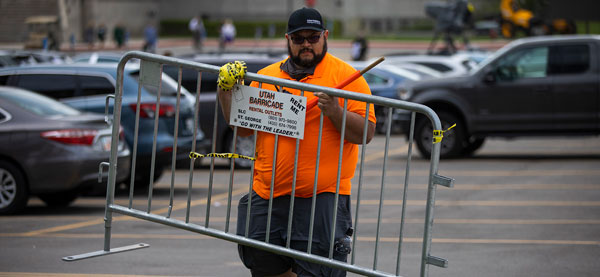UVU strives to create an environment where varied ideas are shared and voices are heard. This page seeks to provide information about your right to exchange ideas on this campus without censorship. Refer to the UVU Freedom of Speech Policy for more details. UVU will intervene in instances of threats of violence, inciting violence, illegal harassment, discrimination, and/or other violations of law.
UVU's Freedom of Speech Policy
UVU Protocols for Engagement in Political Activity
Speech is not just oral or written language; it’s any conduct intended to communicate or express an idea or message that can be reasonably understood. Images, videos, emojis, armbands, etc., all fall within expressive conduct (Source: "Understanding Free Speech on Campus,” Matilyn Mortensen, 2022).

The First Amendment protects the right to free speech, including speech about public institutions and the government. It reads: “Congress shall make no law respecting an establishment of religion, or prohibiting the free exercise thereof; or abridging the freedom of speech, or of the press; or the right of the people peaceably to assemble, and to petition the government for a redress of grievances.”
As it applies to student expression, the First Amendment protects students who express themselves on campus, in class, and in student publications. The First Amendment also protects student gatherings on and off campus.
What is hate speech?
Hate speech is any expression motivated by prejudice or hostility toward a person or group because of the person’s or group’s actual or perceived identity. Hate speech is not illegal. The First Amendment to the United States Constitution protects speech even if it contains offensive content. However, the First Amendment does not protect behavior or expression that cross the boundary into targeted harassment, threats, substantial disruption to university operations, or violence.
What is a hate crime?
At the federal level, a hate crime is a crime motivated by bias against race, color, religion, national origin, sexual orientation, gender, gender identity, or disability. Learn more about hate crimes at the U.S. Department of Justice website.
What is obscenity (Obscene Materials)?
Under the standard set by the U.S. Supreme Court’s decision in Miller v. California, 413 U.S. 15 (1973), whether content is “obscene” depends on three factors:
Only if all three of these factors are satisfied can a public university prohibit speech because it is “obscene.”
What is classroom speech?
“In the landmark case Keyishian v. Board of Regents, 385 U.S. 589 (1967), the Supreme Court reaffirmed the principle that academic freedom is not limited to faculty members but extends to students as well. The Court held that students have the right to express their views, both in and out of the classroom, as long as it does not disrupt the educational environment. This decision ensured that students could engage in political activism and express dissenting opinions without fear of censorship” (Foundation for Individual Rights in Education).
However, this does not mean that students can disrupt the classroom or decline to follow the terms of assignments or other required classroom expression, so long as that expression is reasonably related to legitimate pedagogical objective. E.g. Axson-Flynn v. Johnson, 365 F.3d 1277 (10th Cir. 2004).
What rights are covered under free speech?
What is not covered by free speech?
Utah Valley University and/or police may intervene in these instances and other university policy violations. Such violations may result in disciplinary action up to and including suspension or expulsion. (UVU Policy 541 Student Code of Conduct)

For information on requesting temporary signage, visit UVU’s Signage Website. The university provides indoor and outdoor space for posting signs, notices, posters, and banners. These signs, notices, posters, and banners may include signs for events and expressions of positions and ideas on social or political topics.
All temporary signage must obtain a stamped expiration date from Campus Connection prior to posting. Signs, notices, and posters may be placed in bulletin boards and kiosks located on UVU campus that are maintained by the university.
Signs and literature may not be posted on bulletin boards or kiosks maintained by academic and administrative departments of the university or in classrooms. They also cannot be placed on the following locations unless authorized by the Dean of Students: trees, parts of buildings (walls, doors, windows, fixtures, and handrails), fountains, statues, equipment, furniture, or machinery.
Basically, if a sign is in a location that is not approved, expect it to be taken down. You can request a signage location by filling out the form on UVU’s Signage Website.
UVU does not limit expression, including signage, based on viewpoint.

Any person may hand out and distribute non-commercial (UVU-related) handbills, petitions, or other written material throughout campus without prior approval, as long as the materials:
Information about the distribution of commercial (third-party) handbills can be found on the Signage Website.

Generally, time, place, and manner restrictions refer to requirements on when, where, and how messages may be presented on a university campus. These restrictions are viewpoint-neutral, narrowly tailored to serve significant university interests, and designed to leave open ample alternative channels of communication.
Structures (e.g. booths, tables, buildings, billboards, and banners) may be erected on campus and may deal with any subject matter. Limitations may exist as to the location of the structure and physical requirements.
A permit is required from Event Services prior to erecting structures. Email [email protected].
Click here for comprehensive instructions on structures.
Protests, demonstrations, rallies, vigils, and processions are welcome on campus as free exchanges of ideas and expression. It is not necessary for a person planning a demonstration to get prior permission from the university. Individuals may speak in any outdoor areas. The university also provides places inside the Sorensen Student Center, outside the Student Life and Wellness Center plaza, and in the Pope Science Building courtyard.
These areas are available to anyone as long as they are not already reserved for other activities. Prior scheduling is encouraged but not required. Those with reservations are always given priority. To schedule a specific location or for questions regarding reservations for designated areas, please contact Event Services. Reservable areas can be scheduled for two hours at a time.
If you are planning a demonstration on campus, keep in mind the following restrictions:
UVU has numerous ways to get involved with the campus community. Getting involved can help you meet people and build connections with those who have similar interests, feel more connected to the university, and gain skills necessary for success during and after your time at UVU. UVU is your school, and there is no reason you shouldn’t be involved in what happens.
If you have questions, please email [email protected].
Students are responsible for knowing the information and procedures in the Student Code of Conduct, Policy 541.
Violations of the Student Code of Conduct must be referred to the Office of Student Rights and Accountability. Students may face disciplinary action for those violations.
The Student Code of Conduct applies: